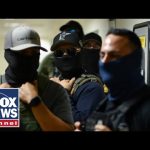In the heart of America, the recent assassination of Charlie Kirk has sent shockwaves through the nation, raising serious concerns about the state of political violence and the deepening divides in society. This tragic event has prompted many, including former Speaker of the House, Newt Gingrich, to call attention to what he describes as a genuine “cultural civil war.” A civil war without the traditional cannons and battlefields, but one carried out on the streets, online, and in the very fabric of American life.
Gingrich, with his characteristic insight, highlights a troubling trend where violence is often overlooked or dismissed when it doesn’t fit a particular narrative. He reflects on the chaos of the summer of 2020, where cities burned, police stations were attacked, and communities were racked by unrest. It seems that the left has a unique way of erasing its own history of violence from the narrative, like a magician pulling a disappearing act. For Gingrich, this isn’t just a matter of memory; it’s a stark reminder that political motivation can incite real danger and chaos.
As Governor Spencer Cox of Utah pointed out following the Kirk assassination, America stands at a critical juncture. The governor describes this moment as a “watershed” in American history. The question hanging in the air is whether this will mark the end of a dangerous chapter or signal the dawn of an even darker one. With tensions simmering and political rhetoric reaching a fever pitch, many fear that we are on the precipice of more violence and discord.
In the wake of the unrest, the Department of Justice has taken a keen interest in the funding behind the protests that have shaken cities across the nation, particularly in Portland, Oregon, where protests escalated into violent confrontations. Some politicians are sounding the alarm, suggesting that organized groups are behind this chaos, and they may not be acting entirely out of personal conviction. There’s speculation about financial backers, and whispers that certain wealthy individuals, such as George Soros, may be involved in funding these riots, which only adds fuel to the already blazing fire of political animosity.
Gingrich emphasizes the need for a closer examination of the motivations behind these protests, suggesting that many participants may be subsidized by larger organizations. This organized effort, according to him, amounts to political terrorism on American soil. The combination of unpaid passion and structured funding creates a toxic brew of ideology and violence. Looking ahead, it’s clear that this situation won’t simply resolve itself. It demands not only scrutiny of financial influences but also an assessment of how online platforms can radicalize individuals and encourage violence.
As the nation grapples with these challenges, it becomes increasingly essential to foster a healthy and constructive dialogue. Americans from both sides of the aisle must confront the reality of this battle, choosing to embrace constructive debate over destructive actions. In this critical moment, the hope is for clarity and understanding to emerge from the shadows of fear and frustration, so the next chapter in American history can be written not in violence, but in cooperation and progress.




